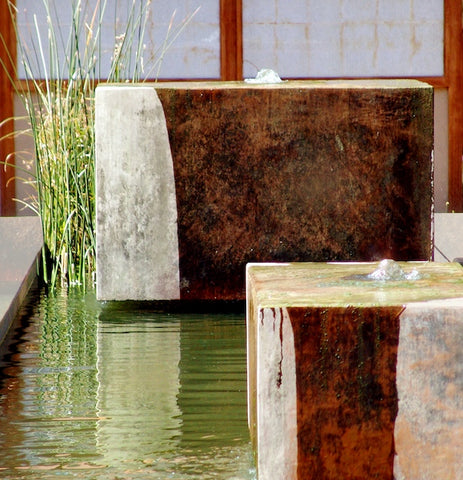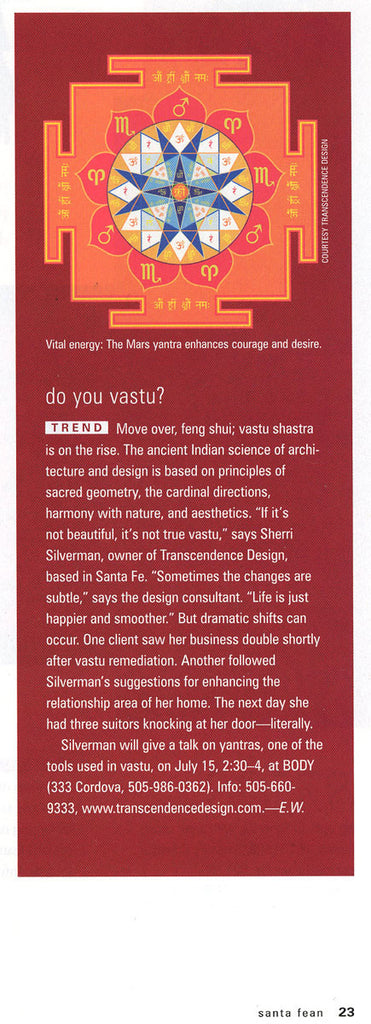Feng Shui Compared With Vastu. Wabi Sabi. Wu Wei.
feng shui, vastu, wabi-sabi, and wu wei
 Feng Shui, Vastu, Wabi-Sabi , and Wu Wei are Asian systems of design and sacred space. Let's compare them.
Feng Shui, Vastu, Wabi-Sabi , and Wu Wei are Asian systems of design and sacred space. Let's compare them.
Vastu, the Yoga of Design, fulfills the intent of all these other Asian design systems and is more comprehensive and profound in its effect. Vastu creates a serene but energized sanctuary for your life. It gives greater benefits in all areas of life, including health, prosperity, happiness, relationships, and well-being.
Feng Shui (pronounced "Fung Shway") is an interior design system from China, literally translated as "wind and water." Ancient China had strong traditions of geomancy and ancestor worship. Feng Shui was originally intended for ideal placement of gravesites so people could gain the most benefit from their pleased ancestors. This developed into a system of placement for buildings.
Vastu, which is thousands of years older, is actually part of Feng Shui's origin. Emperor Ashoka of India sent scholars to teach Vastu and India's other wisdom traditions in Southeast and East Asia, including Vastu.
Like Vastu, Feng Shui's intention is to enable beneficial results in life and the healthy, unobstructed flow of ch'i, or "universal life energy," within a space. Vastu's Sanskrit name for chi, this sparkly life energy, is prana. In Japan it's known as ki.
In spite of Feng Shui's value, after careful study and research, Sherri Silverman, the founder of Transcendence Design, vastly prefers Vastu, the sacred space system from the Vedic tradition. Vastu is both spiritually and scientifically based and universally applicable. Vastu works with the subtle laws of nature that govern creation. Vastu as the Yoga of Design aligns buildings with universal energies: the five elements, beneficial earth energies, and cosmic forces.
There are both overlaps and major differences between Feng Shui and Vastu. Transcendence Design uses only those practical elements of Feng Shui that are harmonious with Vastu and that Sherri has found to be effective in her own home and those of her clients. Learn about Vastu Consultations. Vastu is also compatible with the goals and intentions of Wabi Sabi, the Japanese aesthetic philosophy that values elegance, beauty, serenity, simplicity, authenticity, cleanliness, a meditative quality, and appreciation of and connection with nature. Both systems view beauty as an essential component. If you follow all the rules but do not include beauty, it's not really Vastu!
Vastu is also compatible with the goals and intentions of Wabi Sabi, the Japanese aesthetic philosophy that values elegance, beauty, serenity, simplicity, authenticity, cleanliness, a meditative quality, and appreciation of and connection with nature. Both systems view beauty as an essential component. If you follow all the rules but do not include beauty, it's not really Vastu!
The sadness and melancholy sometimes associated with wabi-sabi is not supported by Vastu, but its true underlying meaning of serenity and alignment with nature is realized even more through application of Vastu principles.
Wabi Sabi's embrace of the impermanence of this world is a spiritual and physical truth. Vastu also acknowledges that everything is always changing, yet Vastu connects your home with the unchanging source of all manifestation. As the spiritual energy of Wabi Sabi suggests, there is no true "perfection" in this life; yet buildings designed according to Vastu retain the precise perfection inherent in the laws of nature and the subtle mechanics of creation. This mathematical perfection allows us greater connection with nature and greater inner freedom and spiritual experience -- a truly authentic life -- the underlying goal of wabi-sabi. Beauty, honoring of nature, and use of natural materials are necessary ingredients of both Vastu and Wabi Sabi.
Likewise, Vastu guidelines support the less well known Chinese Taoist concept of Wu Wei. Wu Wei is based on the ability to intuit placement that creates a good flow of energy and is in alignment with the Tao. The Tao is the "Way," the natural order. Wu Wei advocates going with the flow of nature; it is a non-action approach of following the laws of nature. Since the Tao and pure consciousness / the source of creation / the laws of nature, are simply different cultural expressions of the same universal consciousness, Vastu is in agreement with Wu Wei and can help fulfill its intended goals.
Your Vastu consultation will bring you even more benefit, plus incorporating the qualities you want from Feng Shui, Wabi-Sabi, or Wu Wei.
All cultures around the world value serenity, spirituality, connection to nature, and beauty. Any aesthetics, textiles, and furniture can be incorporated into a Vastu home. How you decorate your Vastu home can involve the expressive variations and "imperfections" of handmade objects revered by Wabi Sabi. Likewise, Transcendence Design can consult on Japanese, Chinese, or other styles that comply with Vastu recommendations, honor the laws of nature, and thus create greater support, abundance, success, tranquility, and harmony in your life. We also offer a series of Vastu Courses.
"Move over, feng shui; vastu shastra is on the rise." Read this 2006 The Santa Fean Magazine article. Note that our phone number has changed since the article's publication. Call 310.948.8229 to schedule your Vastu consultation. 